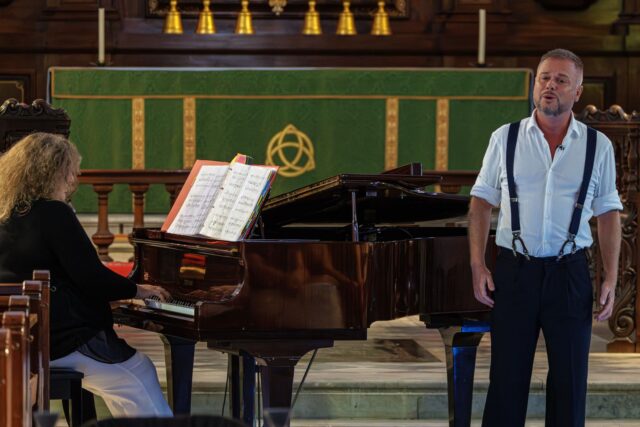A homecoming concert for Nicholas Martin with Destello Azul
Photos by Johnny Bugeja.
MUSIC REVIEW
Some 26 years ago, a young man from Catalan Bay graduated from Canterbury Christ Church University with a combined Honours degree in music and Art.
As an aspiring young tenor then, Nicholas Martin furthered his studies as a post graduate and got a Masters degree in music performance in 2001 and was later awarded a post graduate diploma in advanced vocal training.
Last Thursday in a triumphant homecoming concert at the Holy Trinity Cathedral, sponsored by The Gibraltar Classical Music Society and accompanied by remarkable pianist Lora Dimitrova, a well-chosen collection of Latin American, Spanish and Argentinian tango songs reverberated in the pleasant acoustics of the Cathedral.
The programme was called Destello Azul and, as it turned out, was deservedly sold out. A large contingent of Catalan Bay villagers, including the Martin family led by his grandmother and many members of TGCMS, with a generous sprinkling of local and visiting music lovers enjoyed an unforgettable concert that brought musical memories flooding back to many of them, me included.
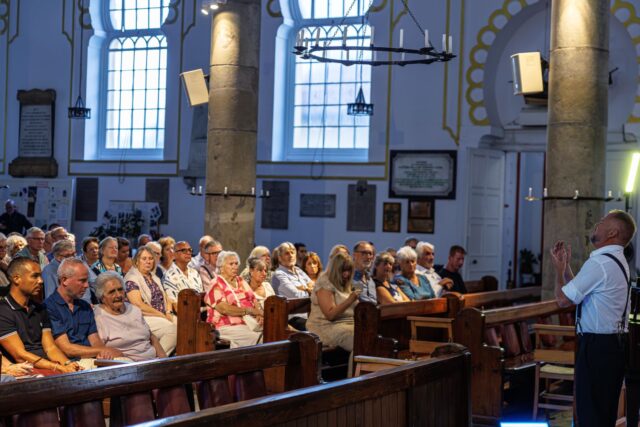
The concert started with a lively opener. Astor Piazzola’s Vuelvo al Sur which was followed seamlessly by the classic Alfonsina y el Mar, which I have heard many times in classical guitar concerts albeit not as a vocal. It was a pleasant first for me.
The lyric story is about the death of Argentinian poet Alfonsina Storni and Nicholas sung the beautiful melody with tenderness, allowing Dimitrova to linger on the central chordal cadences and then return him to a beautiful ending.
Mecano, the legendary Spanish pop group, wrote and had a massive hit in 1986 with Hijo de la Luna which tells a tragic tale of an albino child born to a Romani woman after she had made a pact with the moon, bringing tragedy upon herself when her jealous husband killed her and abandoned the child.
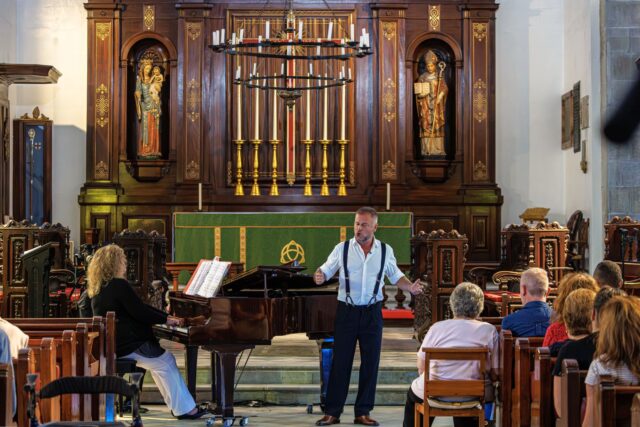
It’s difficult not to remember the Mecano version, however, Nicholas captured all the drama and gave us a fine rendering of the ballad - with haunting piano notes at the intro and throughout the song. It received a resounding ovation.
Next up, Lora Dimitrova played a solo, the choral Herzlich Tut Mit Verlangen. It was great to hear her playing while not competing for attention with a voice, whilst Nicholas rested briefly off-stage.
This was followed by a story about a rose and a willow tree, La Rosa y el Sauce, and a brief romantic song well sung was Se equivoco la Paloma, telling the story of a dove which kept flying in the wrong direction. It alluded to the human condition, reflecting on innocence, disorientation and vulnerability. I noted ‘short but memorable’ about its effect on me.
Another Astor Piazzolla work, Oblivion, allowed Nicholas Martin to sing falsettos with ease, following the melody in familiar sounding cadences with the uplifting chorus coming round a second time to our delight.
A delight which was then turned into great joy as the most famous Carlos Gardel tango, Volver, rang out across the cathedral. It was followed by another Gardel classic, Por una Cabeza, a tango song about compulsive love, comparing it to gambling at horse races.
As the drama of the lyric unfolded, I noted that the distinct Argentinian pronunciation of double Ls (‘shorar’ as in crying) had not been forgotten by our tenor, who closed the first half with the two tangos and very warm applause.
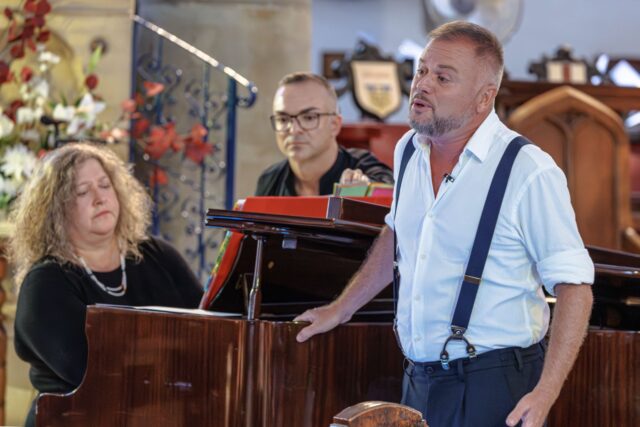
After Puro Teatro, the opener of part two, an enigmatic intro followed by a familiar Argentinian/Latin American melody struck me as a great love song, Eres Todo en Mi, with tinkling piano, evocative melody and tender singing at the last two verses.
Another well-known tango followed it, Uno, a challenging vocal telling of a story of heartbreak and fear of falling in love again. Contrasting with the previous title, a contemporary ballad by Alex Ubago, Sin Miedo, saw Nicholas Martin stretching to the high reaches of the melody with taste and in full control of the passionate lyrics.
A piano solo from Dimitrova, Sonata in C Minor (Mozart), allowed those close enough to the piano to see the complex cross-hands playing, adding to the enjoyment of the piece.
A Mexican ballad, La Llorona, which is better known locally by the version with which Rafael had a hit with in 1967, a song reflecting on love, loss and mourning, received very warm acclaim and it was followed by Maria se Bebe las Calles, a hit for Pasion Vega in 2003 which saw Nicholas wringing out such a heartfelt performance that the audience clapped prematurely before its end.
Naranjo en flor closed the advertised programme, with a standing ovation and shouts for an encore. We got two.
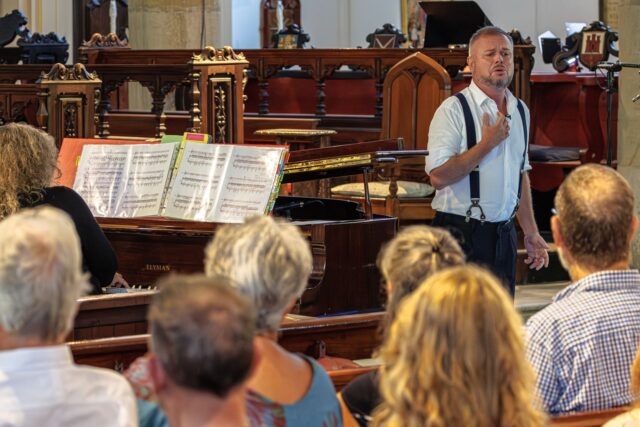
A beautiful Aranjuez, one of the best-loved melodies of the last century, and a resounding Granada, the most expected song of the evening.
I looked around me and saw emotion comparable to what Nicholas Martin was extracting from the famous melody. Dimitrova played it beautifully too and when I shook her hand at the exit door I told her so. Unfortunately I missed meeting Nicholas Martin as he was swamped.
A well-balanced concert of beautiful songs which showcased a local talent which we have missed for too long.
Martin remains in great demand as a performer and vocal coach in the UK.
